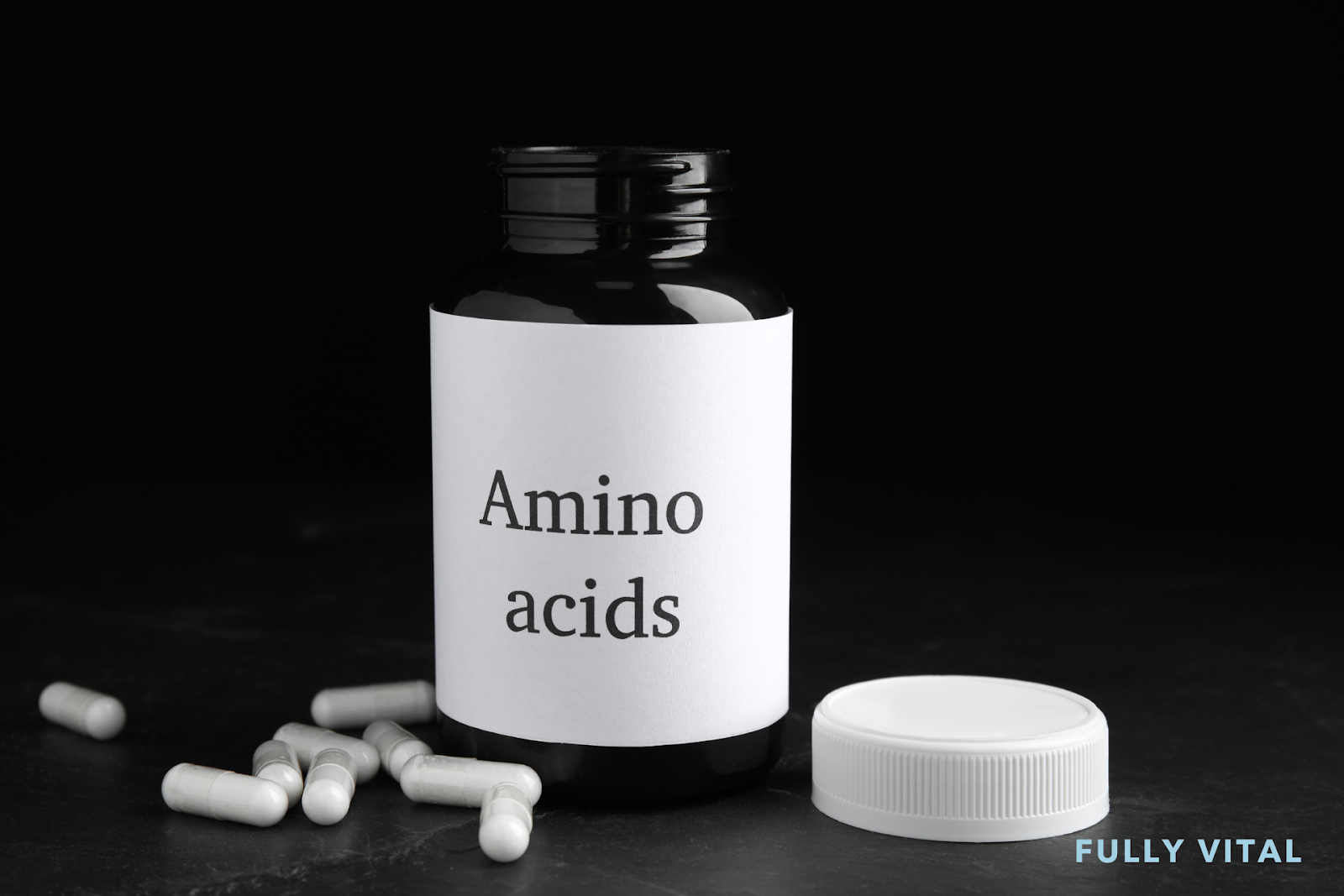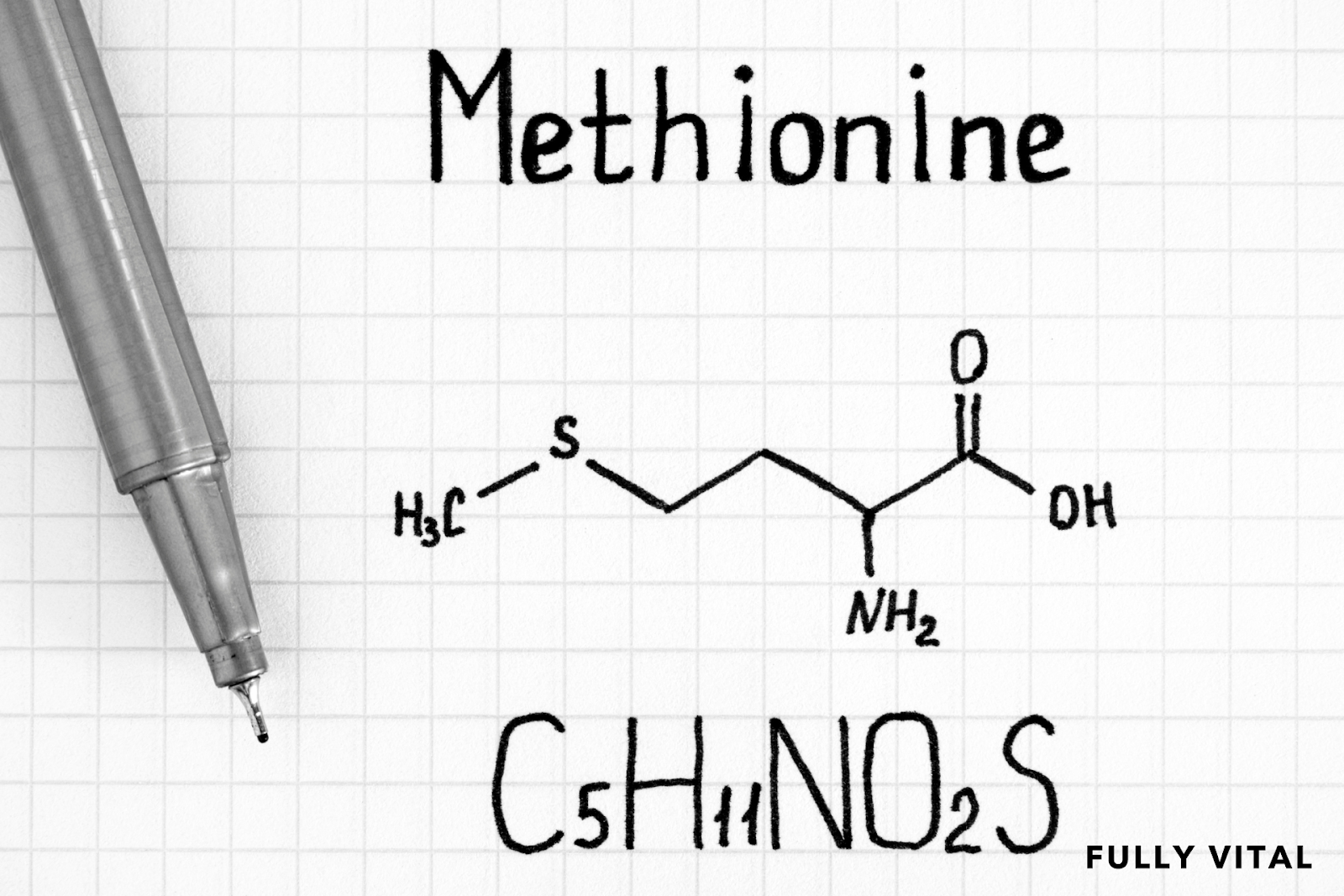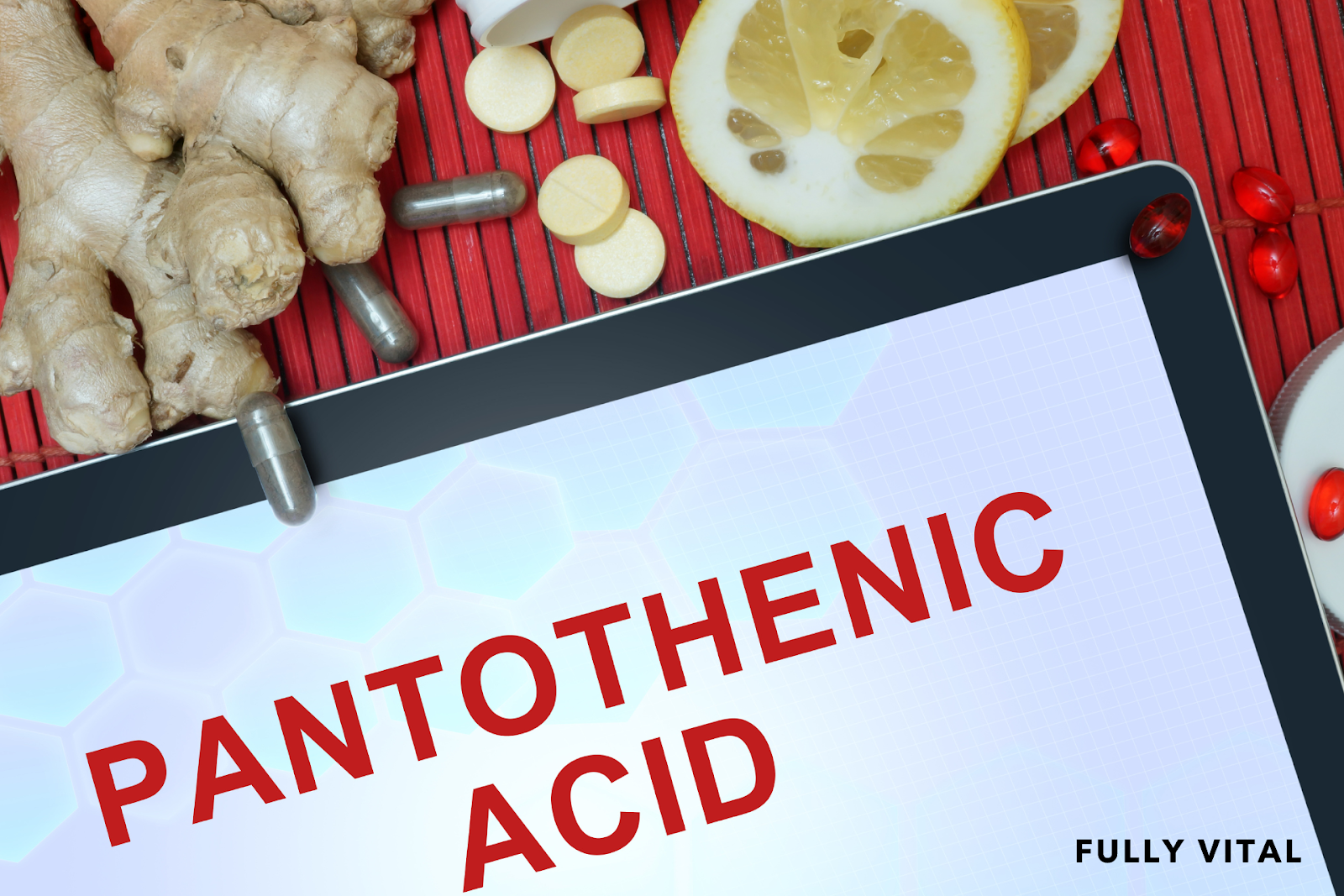
Amino Acids: The Secret to Hair Repair and Regrowth
Exploring the building blocks of hair health, one can't overlook the essential role of amino acids.
These organic compounds are more than just fundamentals of nutrition; they serve as the vital ingredients for maintaining and revitalizing our hair.
In this article, we delve into the science behind how amino acids can be the secret allies in the quest for luscious, strong locks.
Amid a myriad of hair care solutions, understanding the function of amino acids could be the key to unlocking the potential of your hair's natural vitality and strength.
So whether you're struggling with damage, looking for growth, or aiming to maintain your mane, this journey through the benefits of amino acids is tailored for your hair's needs.
Let's unveil the ways in which these powerful molecules can transform your hair care regime and provide a foundation for long-lasting hair health.

I LOVE MY HAIR NOW
FullyVital hair serum and hair vitamins made tremendous improvements in my hair. I truly love my hair now.
Shop Hair ProductsWhat Are Amino Acids?
Amino acids are often called the building blocks of life, and they hold a particularly important place when it comes to hair.
Our hair is primarily made up of a protein called keratin, which is formed by the linkage of amino acids.
These compounds aren't just integral to the structure of hair; they also play a vital role in the growth and quality of our locks.
Various Types and Roles in Hair Health
Out of the 20 amino acids, there are a few that stand out regarding hair.
For instance, cysteine is a powerhouse for hair's strength due to its sulfur content which forms disulfide bonds in hair, providing durability and resilience.1
Arginine, another amino acid, is renowned for its role in protecting hair, and promoting blood flow to the scalp, which can support growth.
Understanding these amino acids offers a pathway to stronger, healthier hair.
With each type contributing uniquely to hair's makeup and wellbeing, they form a complex network that's essential for maintaining the healthiest hair possible
How Can Amino Acids Benefit Your Hair?
Keratin Support and Amino Acid Composition
Amino acids feed into the production of keratin, the primary protein in hair, which means they are directly responsible for its strength and structure.
Cysteine contributes to keratin's reinforcement, making hair less susceptible to damage, while methionine helps with the production of sulfur, which forms cross-linkages ensuring hair strength.
Enhancing Hair Elasticity and Strength
Amino acids like proline and lysine, essential components of collagen, play a critical role in maintaining hair elasticity and resilience.
A scalp rich in these amino acids can better support hair, leading to reduced breakage and healthier growth.
Not only do amino acids strengthen hair, but they also help in the regeneration of damaged follicles, supporting hair regrowth and maintaining scalp health.
The evidence is clear: incorporating amino acids into your hair care routine leads to visible improvements in hair quality.
Can Amino Acids Repair Damaged Hair?
Amino acids have a significant impact on the restoration and maintenance of hair health, particularly when it comes to repairing damage caused by environmental stressors, chemical treatments, and heat styling.
Hair that has been compromised by over-styling, color treatment, or environmental factors often shows signs of damage through dryness, brittleness, and split ends.
Specific amino acids like arginine and glutamine play a critical role in healing and repairing this damage.
They support the scalp's natural barrier, aid in cellular repair, and can even protect hair from further harm.
Moisture Retention and Breakage Prevention
Healthy hair is hydrated hair.
Amino acids like serine effectively bind to the hair fiber, locking in moisture and providing a barrier to keep each strand hydrated.
This moisture retention is essential for preventing breakage and maintaining the overall integrity of the hair.2
Will Amino Acids Promote Hair Regrowth?
Activating Hair Follicles
Certain amino acids, like arginine, are known to help dilate blood vessels and improve blood flow to the hair follicles.
This increased circulation can deliver more nutrients and oxygen to the hair roots, which is essential for promoting the growth of new hair.
It creates a nourishing environment for hair follicles, potentially reducing hair loss and encouraging regrowth.
Nutritional Support for New Growth
Hair growth requires a rich supply of nutrients, and amino acids are at the core of this nutritional network.
Lysine, for example, is crucial in absorbing iron and zinc—two minerals integral for hair growth.
Amino acids can help ensure that these and other nutrients are readily available for producing new, healthy hair strands.
Evidence on Amino Acids and Regrowth
Research has shown a positive correlation between certain amino acids and hair regrowth.
Studies have indicated that amino acid supplementation can help people with conditions like alopecia by providing the scalp with the nutrients needed for fostering new hair growth and strengthening existing strands.3
Where Can You Get Amino Acids in Your Diet?
Nutrient-Rich Food Sources
High-quality proteins are the best dietary sources of amino acids.
These include meats, fish, eggs, and dairy products, which contain all the essential amino acids required for good health and, by extension, strong and healthy hair.
For those with hair thinning or loss, ensuring enough protein intake is particularly important.
Plant-Based Sources for Vegetarians and Vegans
Plant-based protein sources such as legumes, nuts, seeds, and whole grains are also rich in amino acids.
While most plant proteins are incomplete (lacking one or more essential amino acids), combining different plant foods can provide a full complement of necessary amino acids for vegetarians and vegans.
Importance of Nutrient Absorption
Merely eating amino acid-rich foods is not enough; you also need to ensure that your body is effectively absorbing these nutrients.
Factors such as gut health, overall diet balance, and the presence of sufficient digestive enzymes all play a part in nutrient absorption.
Additionally, certain vitamins and minerals are known to enhance the body’s ability to utilize amino acids efficiently.

Should You Consider Amino Acid Supplements for Hair?
For those who may not get sufficient amino acids from their diet, supplements can be a practical solution to support hair health.
Supplement Overview
Amino acid supplements come in various forms, including powders, capsules, and liquids.
They often contain a blend of different amino acids specifically formulated to support health and well-being.
When it comes to hair, these supplements may provide the additional amino acids required to support keratin production and protect the follicles.
How to Select Supplements
When choosing an amino acid supplement for hair, look for products that contain a balance of the essential amino acids, particularly those known for their benefits to hair, like cysteine, methionine, lysine, and arginine.
It's also essential to choose a high-quality supplement from a reputable brand to ensure efficacy and safety.
Comparing Food to Supplements
While getting amino acids from whole food sources is ideal due to the additional nutrients they provide, supplements can be an effective alternative for those with dietary restrictions or certain health conditions.
However, supplements should complement a healthy diet, not replace it.
Always consult with a healthcare professional before starting any new supplement regimen to ensure it's appropriate for your health situation.
How Are Amino Acids Used in Hair Care Products?
Ingredients in Shampoos and Conditioners
Many shampoos and conditioners incorporate amino acids, such as arginine, serine, and threonine, which can penetrate the hair shaft and hydrate the hair from within.
These ingredients help to rebuild hair's strength, enhance shine, and protect from damage by environmental factors or heat styling.
The Role of Leave-in Treatments and Hair Masks
Leave-in treatments and hair masks often contain higher concentrations of amino acids.
They are designed to provide a deep conditioning effect, repairing, and smoothing the hair fibers.
Regular use of these products can lead to improved hair texture, reduced frizz, and a healthier appearance over time.
Identifying Quality Hair Products
When searching for hair care products containing amino acids, check for ones that list them high on the ingredients list, which indicates a higher concentration.
Quality products may also pair amino acids with other nourishing ingredients like natural oils and extracts to maximize the health benefits for your hair.
How Can You Integrate Amino Acids Into Your Hair Routine?
Incorporating amino acids into your hair care routine can be straightforward and highly beneficial for the health of your hair.
Effective Daily Hair Care Steps
Begin with a shampoo and conditioner enriched with amino acids; these are foundational for daily hair care.
Consider regular treatments with hair masks or leave-in products that contain amino acids to deeply condition and repair the hair.
Steering Clear of Common Hair Care Pitfalls
To avoid negating the benefits of amino acids, minimize hair exposure to harsh chemicals and heat styling.
Opt for gentle hair care practices, protect your hair from extreme weather conditions, and ensure a consistent routine that prioritizes hair health.

What Precautions Should You Take When Using Amino Acids?
While amino acids are generally beneficial for hair health, there are precautions to keep in mind to ensure their proper usage and effectiveness.
Tailoring to Hair Type and Condition
It's important to recognize that not all hair types will respond the same way to amino acid treatments.
Understand your hair's specific needs and condition to select products that complement it.
For example, fine hair might require lighter formulations to avoid weighing it down.
Recognizing Possible Adverse Reactions
Despite being natural components of the hair, topical or supplemental amino acids may cause adverse reactions in rare cases, such as scalp irritation.
Always conduct a patch test when using a new hair care product and start with a small dosage when taking supplements, gradually increasing it as tolerated.
Seeking Professional Advice
Consider consulting with a healthcare provider or a hair care professional before significantly altering your hair care regimen or starting a new supplement.
They can offer personalized advice based on your health status and hair care needs.
Discover the Effectiveness of Fully Vital's Hair Growth SolutionsUncover the distinctive features and advantages of our scientifically supported hair growth products:
Embark on the journey to achieving healthier, more vibrant hair with Fully Vital. Begin experiencing the positive effects of our hair growth products and reclaim authority over the aging process of your hair. |
Final Thoughts On Amino Acids
Harnessing the power of amino acids presents a promising pathway for those seeking to restore, strengthen, and enhance their hair health.
From building the robust structure of keratin to healing and hydrating damaged strands, amino acids offer wide-ranging benefits that are both preventative and restorative.
While incorporating amino acids into your diet through high-quality proteins is ideal, hair care products enriched with these vital compounds provide a targeted approach to improving hair condition.
As with any regimen, it's crucial to consider your individual hair type and consult with professionals to optimize the benefits while avoiding potential pitfalls.
Ultimately, the secret to lush, resilient hair could very well lie in the mighty amino acid, a fundamental ingredient in the science of hair care.
Check out our recent blogs:
- Why The Roller Is So Effective At Regrowing Hair?
- The ULTIMATE Natural Hair Growth Plan Revealed
- 7 Daily Habits That Are Damaging Your Hair
Frequently Asked Questions About Amino Acids
What role do amino acids play in hair health?
Amino acids contribute to the formation of keratin, the primary protein in hair, providing it with strength and elasticity.
They also aid in scalp health and hair growth.
Can amino acids actually repair damaged hair?
Yes, amino acids can help to heal damaged hair by restoring protein content, improving moisture retention, and protecting hair from further damage.
Are amino acids beneficial for hair regrowth?
Amino acids, such as arginine, help in promoting blood circulation to the scalp, nourishing hair follicles, and can support healthy hair regrowth.
How can I include amino acids in my diet?
Amino acids are found in protein-rich foods like meats, fish, eggs, dairy products, legumes, nuts, and seeds.
Should I take amino acid supplements for my hair?
Amino acid supplements may be helpful if you're not getting enough from your diet, but it's best to consult with a healthcare provider before starting any new supplementation.
What hair care products contain amino acids?
Many shampoos, conditioners, leave-in treatments, and hair masks contain amino acids aimed at improving hair health.
Do amino acids have side effects when used in hair care?
Amino acids are generally safe for hair care, but it's important to do a patch test for new products to ensure there's no adverse reaction.
How often should I use amino acid hair care products?
Follow product instructions, but most amino acid-infused hair care items can be used as part of your regular hair care routine.
Can amino acids make my hair grow faster?
While individual results may vary, amino acids provide the necessary nutrients for hair health and may contribute to optimal hair growth conditions.
Are there vegan sources of amino acids for hair health?
Yes, vegans can obtain amino acids from plant-based proteins like legumes, nuts, seeds, and whole grains by combining different sources to form complete proteins.
Sources:
- Inoue, T., Takehara, K., Shimizu, N., Kitajima, Y., Shinohara, K., & Ito, A. (2011). Application of XANES profiles to X-ray spectromicroscopy for biomedical specimens: part II. Mapping oxidation state of cysteine in human hair. Journal of X-Ray Science and Technology, 19(3), 313–320. https://doi.org/10.3233/XST-2011-0295
- Liu, Y., Liu, J., & Xiao, J. (2023). Enzymatic Crosslinking of Amino Acids Improves the Repair Effect of Keratin on Hair Fibre. Polymers, 15(9), 2210. https://doi.org/10.3390/polym15092210
- Milani, M., & Colombo, F. (2023). Efficacy and tolerability of an oral supplement containing amino acids, iron, selenium, and marine hydrolyzed collagen in subjects with hair loss (androgenetic alopecia, AGA or FAGA or telogen effluvium). A prospective, randomized, 3‐month, controlled, assessor‐blinded study. 29(6). https://doi.org/10.1111/srt.13381








